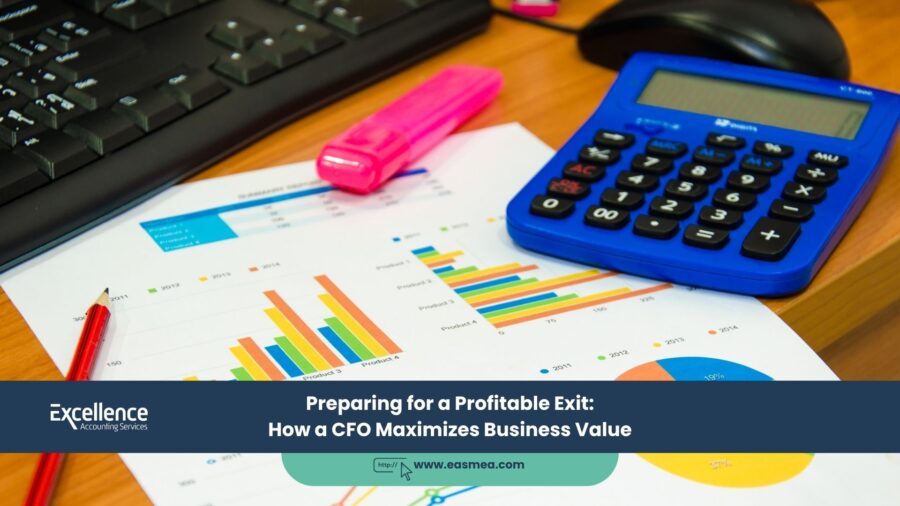Preparing for a Profitable Exit: How a CFO Maximizes Business Value
For many entrepreneurs, the ultimate goal is a profitable exit—a successful sale or merger that represents the culmination of years of hard work, risk, and dedication. However, a lucrative exit is rarely a matter of luck or timing. It is the result of a deliberate, multi-year strategy designed to build a resilient, attractive, and highly valuable business. At the heart of this strategic preparation is a figure who goes far beyond traditional accounting: the Chief Financial Officer (CFO).
A forward-thinking CFO is not just a financial scorekeeper; they are a strategic architect of value. They transform the finance function from a backward-looking reporting center into a forward-looking value creation engine. By focusing on the key drivers that potential buyers scrutinize, a CFO can systematically enhance a company’s financial health, de-risk its operations, and polish its story, ultimately leading to a significantly higher valuation and a smoother transaction process.
This guide explores the pivotal role of a CFO in preparing a business for a profitable exit. We will delve into the strategic roadmap they implement years in advance, from fortifying the financials to navigating the complexities of due diligence. Understanding this process is essential for any business owner who wants to ensure they receive the maximum possible return on their life’s work.
Key Takeaways
- Exit Planning is a Marathon, Not a Sprint: The process of maximizing value begins 3-5 years before a potential sale, focusing on long-term strategic improvements.
- The CFO as a Value Architect: A strategic CFO’s role transcends accounting; they actively drive profitability, optimize cash flow, and mitigate risks that could lower the company’s valuation.
- Bulletproof Financials are Non-Negotiable: Buyers pay a premium for certainty. Clean, audited financials and robust internal controls eliminate doubts and build buyer confidence.
- Value is in the Story and the Numbers: A CFO helps craft a compelling growth narrative that is rigorously supported by credible financial forecasts and operational data.
- Due Diligence is Make-or-Break: A well-prepared company, led by a competent CFO, can navigate the intense scrutiny of due diligence smoothly, preventing last-minute valuation cuts. Outsourced CFO services can provide this expertise on demand.
The CFO’s Strategic Roadmap to a Higher Valuation
Maximizing exit value is a phased process. A strategic CFO orchestrates this journey by focusing on different priorities at each stage leading up to the sale.
Phase 1: Laying the Foundation (3-5 Years Before Exit)
This initial phase is about building a rock-solid operational and financial infrastructure. It’s about cleaning house and ensuring the business is fundamentally sound and transparent.
1. Building a Fortress of Financials
Buyers and investors are buying future cash flows, but they verify them by scrutinizing past performance. If the historical data is messy, incomplete, or unreliable, they will immediately discount the value of the business. The CFO’s first job is to ensure the financials are “bulletproof.”
- Impeccable Accounting and Bookkeeping: This means moving beyond basic data entry to ensure all transactions are accurately categorized and compliant with International Financial Reporting Standards (IFRS) or Generally Accepted Accounting Principles (GAAP).
- Clean Audit Trail: A history of clean, unqualified audits from a reputable firm is one of the most powerful signals of financial integrity. The CFO manages this process and ensures the company is “audit-ready” at all times.
- Robust Internal Controls: Implementing and documenting internal controls over financial reporting reduces the risk of fraud and error, giving buyers confidence in the numbers. A thorough internal audit can identify and remedy weaknesses.
2. Strategic Planning and Forecasting
A buyer isn’t just buying your past; they’re investing in your future. The CFO is responsible for creating a credible, data-driven financial model that tells a compelling growth story. This includes:
- Multi-Year Financial Models: Developing detailed, bottoms-up forecasts for the income statement, balance sheet, and cash flow statement.
- KPI Dashboards: Identifying and tracking Key Performance Indicators (KPIs) that are relevant to the industry (e.g., Customer Acquisition Cost, Lifetime Value, Churn Rate) to demonstrate a deep understanding of the business drivers.
- Scenario Analysis: Building best-case, base-case, and worst-case scenarios to show resilience and preparedness.
Phase 2: Enhancing Value Drivers (1-3 Years Before Exit)
With a solid foundation in place, the focus shifts to actively improving the metrics that buyers value most.
1. Driving Profitability and Margin Improvement
A CFO dissects the business to find opportunities to increase profitability.
- Pricing Strategy: Analyzing pricing models to ensure they maximize value without sacrificing volume.
- Cost Optimization: Scrutinizing every expense line item, from supplier contracts to operational overheads, to eliminate waste.
- Gross Margin Analysis: Focusing on improving the profitability of each product or service line.
2. De-Risking the Business
Every risk identified by a buyer will translate into a potential reduction in the purchase price. A strategic CFO works proactively to mitigate these risks.
| Risk Area | CFO’s Mitigation Strategy |
|---|---|
| Customer Concentration | Working with sales to diversify the customer base so that no single client represents a disproportionate share of revenue. |
| Supplier Dependence | Identifying and qualifying alternative suppliers for critical components to avoid supply chain disruption. |
| Key-Person Risk | Ensuring processes are documented, knowledge is shared, and succession plans are in place for critical employees. Implementing retention agreements. |
| Regulatory & Legal Compliance | Conducting a compliance audit to ensure all licenses are current, contracts are solid, and there are no pending legal issues. |
3. Optimizing Working Capital
Efficiently managed working capital signals a healthy, self-sufficient business. A CFO focuses on:
- Accounts Receivable: Shortening the cash conversion cycle by implementing stricter credit policies and more effective collections processes.
- Accounts Payable: Negotiating better payment terms with suppliers without damaging relationships.
- Inventory Management: Reducing excess and obsolete stock to free up cash and reduce carrying costs.
Phase 3: The Transaction (The Final Year)
This is where all the preparation pays off. The CFO takes the lead in managing the intense and demanding sale process.
- Preparing the Data Room: The CFO oversees the assembly of a virtual data room containing all the financial, legal, and operational information a buyer will need for their due diligence.
- Crafting the Narrative: Working with the CEO and investment bankers to create the marketing materials for the sale, ensuring the financial story is powerful, consistent, and defensible.
- Managing Due Diligence: Acting as the central point of contact for the buyer’s financial questions, defending the numbers, and ensuring a smooth, organized flow of information.
- Negotiating and Closing: Playing a critical role in negotiating the financial aspects of the deal, including the final price, working capital adjustments, and other terms.
How Excellence Accounting Services (EAS) Prepares You for Your Exit
Most small and medium-sized enterprises don’t have the need or budget for a full-time, strategic CFO. Excellence Accounting Services bridges this gap by providing expert, on-demand CFO Services designed to maximize your company’s value ahead of a sale.
- Exit Readiness Assessment: We conduct a comprehensive review of your business from a buyer’s perspective, identifying strengths, weaknesses, and a clear roadmap for value enhancement.
- Financial “Clean-Up” and Fortification: Our team will clean up historical books, implement robust accounting processes, and prepare you for the rigors of a financial audit.
- Strategic Financial Modeling: We build sophisticated financial models and KPI dashboards that tell your growth story in the language investors understand.
- Due Diligence Preparation: We help you prepare your virtual data room and manage the due diligence process, allowing you to stay focused on running your business.
- Valuation and Negotiation Support: Leveraging our business valuation expertise, we provide critical support during the negotiation phase to ensure you achieve the best possible financial outcome.
Frequently Asked Questions (FAQs)
The ideal time is 3-5 years before you intend to sell. This provides enough time to make meaningful strategic improvements that will concretely increase the company’s value. However, it’s never too early to start running your business as if you were going to sell it tomorrow. This instills discipline and good habits.
Waiting until they are ready to retire to start thinking about the sale. By this point, it’s often too late to fix underlying issues, and owners are forced to accept a lower price. A lack of preparation, especially regarding financial records, is the most common and costly error.
A CFO provides the reliable data that valuation models depend on (e.g., EBITDA, cash flow projections). They also influence the “multiple” a buyer is willing to pay by de-risking the business and presenting a credible growth story. A well-managed company with predictable earnings will always command a higher multiple than a chaotic one.
A QoE report is an in-depth analysis conducted during due diligence to verify the accuracy and sustainability of a company’s reported earnings (usually EBITDA). It adjusts for one-time expenses, non-recurring revenues, and accounting anomalies. A CFO prepares for the QoE by ensuring the books are clean and all adjustments are well-documented and defensible.
Buyers expect a business to be delivered with a “normal” level of working capital. At closing, the actual working capital is compared to a pre-agreed target. If the actual amount is lower, the purchase price is reduced. A CFO’s job is to manage working capital efficiently in the months leading up to the sale and to negotiate a fair target to avoid a negative adjustment.
Absolutely. For many SMEs, an outsourced CFO is the most cost-effective way to access high-level strategic financial expertise. An experienced outsourced CFO can implement the same rigorous processes and strategies as a full-time executive, focusing specifically on exit readiness over a defined period.
It’s never too late, but it will require a significant “clean-up” project. A CFO or a specialized accounting service would need to undertake a comprehensive review of past transactions, reconcile all accounts, and restate historical financials if necessary. It’s a critical investment to make before going to market.
An unsolicited offer can be both exciting and dangerous. A CFO provides a calm, data-driven perspective. They will quickly assess the credibility of the offer, perform an internal business valuation to determine if the price is fair, and evaluate whether the company is even ready for the due diligence process that would follow.
Both are important, but for most buyers, **sustainable profitability** is key. High revenue growth with no profit (or worsening losses) can be a red flag, suggesting an unsustainable business model. A CFO works to achieve a balance: strong, predictable revenue growth combined with healthy and improving profit margins.
Retaining key talent through the uncertainty of a sale is critical. A CFO helps design and implement retention plans, such as transaction bonuses or “stay bonuses,” that are tied to the successful closing of the deal. This aligns the interests of key employees with those of the owner, ensuring a stable transition.
Conclusion: Your Exit is Your Legacy
Selling your business is one of the most significant financial events of your life. It’s the monetization of your legacy. Treating the exit as a strategic, multi-year project, rather than a last-minute transaction, is the only way to ensure you are fully rewarded for the value you’ve created. By engaging a strategic CFO early in the process, you shift the odds dramatically in your favor, transforming your finance function into a powerful engine for maximizing value and securing a prosperous future.
Don't Leave Your Legacy to Chance.
Partner with Excellence Accounting Services to get the strategic financial leadership you need to maximize your company's value and prepare for a successful sale.




